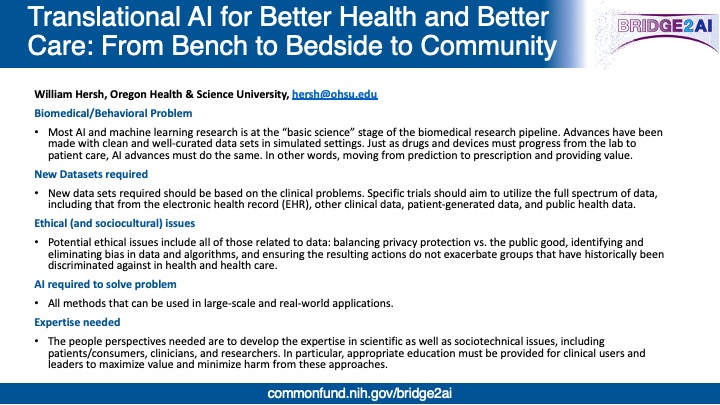 William Hersh, MD, Professor and Chair, OHSU
William Hersh, MD, Professor and Chair, OHSU
Blog: Informatics Professor
Twitter: @williamhersh
The potential for artificial intelligence (AI) to transform biomedicine and health is immense, yet at this time that potential remains largely unfulfilled. As I have noted in this blog over the years, there have been many impressive achievements in applying AI to biomedical and health data using clean and well-curated data sets, yet its use in every day medical care or health pursuits is modest. I have noted the reasons for this gap over the years in various postings, namely in the need to move capabilities beyond prediction to the ability to take action on them and the importance of showing actual clinical value, whether in leading to better health outcomes or care delivery. Failure to achieve these will relegate AI to the same fate as its first generation in the last century.
The premiere research agency in the US, the National Institutes of Health (NIH), has recognized the need to advance the science of AI in biomedicine. As such, the NIH has launched a new initiative, Bridge to Artificial Intelligence (Bridge2AI), which aims to “propel biomedical research forward by setting the stage for widespread adoption of artificial intelligence (AI) that tackles complex biomedical challenges beyond human intuition.”
I applaud this program, and hope it will address the larger picture of translating current advances in AI into algorithms and systems that truly lead to improved health outcomes and care delivery. Along the way, it will hopefully address other issues related to AI, such as deploying AI ethically, focusing on solving important problems, and developing human expertise, not only of those who implement and evaluate AI systems but also the clinicians who employ them in their professional practice and patients who understand the benefits and limitations.
The Bridge2AI program recently hosted a virtual workshop series. One of these was devoted to enumerating grant challenges for AI in biomedicine. Participants were allowed to suggest grand challenges related to any aspects of the problems or solutions. I submitted a grand challenge focused on what I perceive is the need for translational AI, i.e., building on the successes in the “basic science” of showing the predictive value of algorithms to studying and ultimately deploying evidence-based AI in the real world. My grand challenge was one of 25 accepted by the meeting organizers for presentation to workshop attendees. We were allowed to use one slide, which is shown below.

To reiterate from my slide and presentation, I noted that most AI and machine learning research is still at the “basic science” stage of the biomedical research pipeline. Advances have been made with clean and well-curated data sets in simulated settings. Just as drugs and devices must progress from the lab to patient care, AI advances must do the same. In other words, moving from prediction to prescription and providing value. There are all sorts of potential ethical issues that must be addressed in the translational activities, such as balancing privacy protection vs. the public good, identifying and eliminating bias in data and algorithms, and ensuring the resulting actions do not exacerbate groups that have historically been discriminated against in health and healthcare. It is also critical that the “people perspectives” are addressed to develop the expertise in scientific as well as sociotechnical issues, including patients/consumers, clinicians, and researchers. In particular, appropriate education must be provided for clinical users and leaders to maximize value and minimize harm from these approaches. I am hardly the only person to hold these views, and a number of others have articulated the importance of AI providing real-world value in its application in biomedicine and health.[¹-³]
One concern I have for Bridge2AI is that the first round of funding opportunities is focused on data generation projects. Generating high-quality, ethically-sourced, and relevant data is of course necessary, but is not sufficient. In fact, I have a hard time aligning what is proposed in my grand challenge with this initial funding opportunity. I hope that Bridge2AI will broad the focus of research and usher in translational research and ultimately demonstrates its true potential to improve human health.
References
¹ Allen, B., Agarwal, S., Kalpathy-Cramer, J., Dreyer, K., 2019. Democratizing AI. Journal of the American College of Radiology 16, 961–963.
² Wiens, J., Saria, S., Sendak, M., Ghassemi, M., Liu, V.X., Doshi-Velez, F., Jung, K., Heller, K., Kale, D., Saeed, M., Ossorio, P.N., Thadaney-Israni, S., Goldenberg, A., 2019. Do no harm: a roadmap for responsible machine learning for health care. Nat. Med. 25, 1337–1340.
³ Faes, L., Liu, X., Wagner, S.K., Fu, D.J., Balaskas, K., Sim, D.A., Bachmann, L.M., Keane, P.A., Denniston, A.K., 2020. A Clinician’s Guide to Artificial Intelligence: How to Critically Appraise Machine Learning Studies. Transl Vis Sci Technol 9, 7.
This article post first appeared on The Informatics Professor. Dr. Hersh is a frequent contributing expert to HealthIT Answers.
